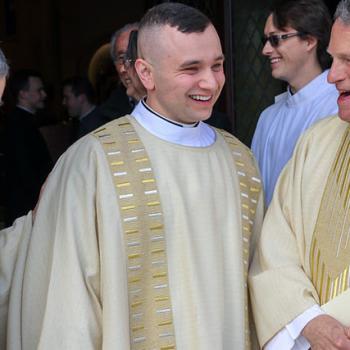Taken together, these consistent actions of Jesus suggest a Christian attitude toward the issue of health care; if we take his life and teaching seriously, Jesus seems to indicate that healing and taking care of the needs of those who cannot take care of themselves are supreme Christian values. Jesus is a force of life and hope who empowers—and requires—his disciples to heal and feed and teach and restore people to their right selves. All of this argues that we may, as Christians, be called to uncomfortable places when we begin to serve our brothers and sisters, a place where our secular boundaries and values would call us to stop short.
The upcoming gospel lesson for July 22 in the Revised Common Lectionary is a familiar passage, one of the two great feedings in the Gospel of Mark:
As he went ashore, [Jesus] saw a great crowd; and he had compassion for them, because they were like sheep without a shepherd; and he began to teach them many things. When it grew late, his disciples came to him and said, "This is a deserted place, and the hour is now very late; send them away so that they may go into the surrounding country and villages and buy something for themselves to eat." But he answered them, "You give them something to eat." They said to him, "Are we to go and buy two hundred denarii worth of bread, and give it to them to eat?" And he said to them, "How many loaves have you? Go and see." When they had found out, they said, "Five, and two fish." Then he ordered them to get all the people to sit down in groups on the green grass. So they sat down in groups of hundreds and of fifties. Taking the five loaves and the two fish, he looked up to heaven, and blessed and broke the loaves, and gave them to his disciples to set before the people; and he divided the two fish among them all. And all ate and were filled; and they took up twelve baskets full of broken pieces and of the fish. Those who had eaten the loaves numbered five thousand men. (Mark 6: 34-44, NRSV)
Jesus takes compassion on the crowd, who are like lost sheep, but he calls on his disciples to bring that compassion to life. "You give them something to eat," he says (which, we imagine, is followed by: "You give them this food," and "You go and collect the leftovers").
I will confess to you that I am distressed by this command: "You give them something to eat." Why can't they get their own food? Why can't they make their own money? Why can't I be left alone, in peace and relative prosperity?
Why does Jesus ask me to do things I don't really want to do?
I want a faith that requires of me only that I be a generally nice person who feels sympathetic toward those who have real needs.
I want a faith identified by my identification; I'm a Christian, see?
I want a faith that doesn't cost me anything.
I want a faith that preserves my freedom, my money, my autonomy, my privacy.
But that's not what Jesus asks of us; Jesus asks us for all we have, and all we are.
(Or, in other words, Jesus asks us to recognize that God has given us all we have, and to recognize that too, so that we don't think of anything as purely ours.)
In his piece for Forbes, I think Charles Kadlec badly misunderstood President Obama's reference to the military as exemplary citizens in his State of the Union Address:
The President was asking the American people to imagine themselves not as individuals in a free society, but as members of a military organization selflessly following the orders of their superior officers no matter the personal cost up through the chain of command to the President as Commander in Chief.
As I recall the address, President Obama was doing no such thing. The military was used as a metaphor to invite Mr. Obama's listeners to imagine what a society might look like if it was founded not on an absolute concern for our own freedoms, but on concern for everyone, how we might envision a society that understood shared sacrifice as a prerequisite for our success as a nation.
I asked in Faithful Citizenship,
What does it cost us to live out our faith? It should, if we understand it rightly, cost us everything. That, according to Dietrich Bonhoeffer—the German pastor and theologian who was executed for plotting against Hitler—is always the cost of discipleship. Unlike the faith condemned by William Law as worship or personal holiness that doesn't transform our lives, the Rev. Bonhoeffer challenges us to embrace what he calls "costly grace," grace that requires our absolute obedience to the call of Christ. "Such grace is costly," he says, "because it calls us to follow, and it is grace because it calls us to follow Jesus Christ. It is costly because it costs a man his life, and it is grace because it gives a man the only true life." (Dietrich Bonhoeffer, The Cost of Discipleship, 45)





